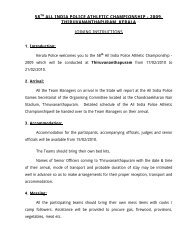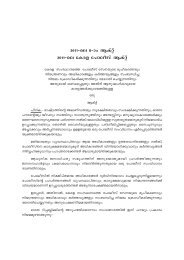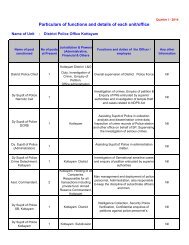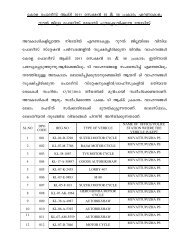Janamaithri Suraksha Project - Kerala Police
Janamaithri Suraksha Project - Kerala Police
Janamaithri Suraksha Project - Kerala Police
Create successful ePaper yourself
Turn your PDF publications into a flip-book with our unique Google optimized e-Paper software.
<strong>Janamaithri</strong> <strong>Suraksha</strong> <strong>Project</strong>: A Study<br />
37<br />
Dr. Celine Sunny<br />
Sudha Namboothiri<br />
From time immemorial, image of a cop has been that of an authoritarian. They were the<br />
less tolerant and among the last of the public servants that the common man or the elite went to,<br />
for help and support.<br />
Even in this country, the largest democracy in the world, the cop was someone everybody<br />
wanted to complain of and not complain to.<br />
Yet, the presence of a policeman on the street, however unfriendly, was a solace to many a weak soul.<br />
Empowered to enforce the law, protect property and reduce civil disorder, policing has<br />
included an array of activities in different situations, but the predominant one is concerned with the<br />
preservation of order. They play an increasingly important role in peace keeping.<br />
The globalization of crime and the growing threats of terrorism has forced the change of<br />
image of the police making him a COP (Community <strong>Police</strong>) in the true sense.<br />
In <strong>Kerala</strong>, the Justice K T Thomas Commission on police reforms appointed by the<br />
Government of <strong>Kerala</strong> suggested the implementation of community policing on an experimental<br />
basis. Accordingly, the community policing initiative which is the embodiment of the idea of people’s<br />
police, had its formal set go in <strong>Kerala</strong> in the year 2008 under the banner <strong>Janamaithri</strong> <strong>Suraksha</strong><br />
<strong>Project</strong> (JSP).<br />
While it started in 20 police stations in the first phase, it was extended to another 23 police<br />
stations in the year 2009, then extended another 105 police stations in the year 2010. Later, 100<br />
more police stations were added to this list in the year 2012. Demands for inclusion of more and<br />
more police stations are coming. Nevertheless, lack of finance and the personnel required has<br />
restricted its expansion to all the police stations in the state.<br />
From being the whole and sole in-charge of the law and order, the police now work in<br />
tandem with community participation as the people of a community could act as agents of peace<br />
and order in their area of residence through a number of ways.<br />
It is this recognition of community participation that gave birth to the concept of community<br />
policing which seeks the responsible participation of the citizens in crime prevention at the level of<br />
the local community, conserving the resources, both of the community and of the police, in fighting<br />
against crimes which threaten the security of the community at the global level.<br />
Implemented under the <strong>Janamaithri</strong> <strong>Suraksha</strong> <strong>Project</strong>, community policing seeks to develop<br />
closer ties between the police and the citizens, and create synergistic partnerships within local<br />
communities to deal effectively with anti-social activities and prevent crime. Subsequently, as part<br />
of the <strong>Janamaithri</strong> <strong>Suraksha</strong> programme, police are encouraged to take initiative in implementing<br />
various projects in local communities, with the support of local community members. Some of the<br />
activities that are envisioned by the project were:<br />
1. Night patrolling within neighborhoods<br />
2. Coordination with security guards of private establishments and residential colonies<br />
3. Identification of strangers in the locality<br />
4. Installation of security alarm systems in residences and other establishments<br />
5. Arrangements for increased security for senior citizens, women and children, as well as<br />
persons with physical handicaps and other disabilities.<br />
6. Establishment of 24-hour Telephone Help-lines for use by citizens, esp. the needy sections<br />
of society.<br />
7. Awareness classes and crime prevention workshops on Traffic, Drug Use, and other<br />
violations of the Law, especially in educational institutions.<br />
8. Institution of Traffic Warden System by co-opting members of the public in traffic regulation<br />
duties.

















